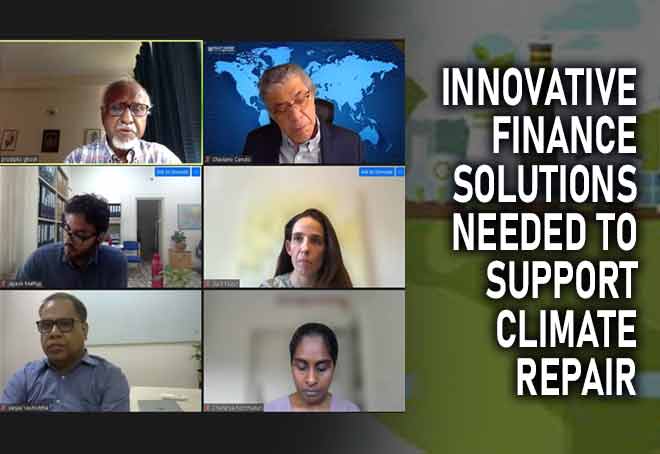Innovative finance solutions needed to support climate repair
Updated: Jun 07, 2023 03:36:08pm

Innovative finance solutions needed to support climate repair
New Delhi, June 7 (KNN) India needs to think of creating innovative finance solutions to create the backbone of the climate recovery regime, said Prodipto Ghosh, former Environment Secretary of India.
Moderating the international webinar on Innovative Finance Solutions for Climate and the Planet organised by CUTS International, he said that there is an inadequacy of funds to deal with the salvaging of climate and biodiversity losses.
The combined climate flows of traditional sources of finance, including contributions by multilateral financial institutions, stand at roughly USD 100 billion per year, which represents a tiny proportion of the actual global requirements. Most scholars agree that the required funding is of the order of USD 7rillion.
Moreover, only a small portion of this sum is given in the form of concessional finance.
Otaviano Canuto, a Non-Resident Senior Fellow at the Brookings Institution and fomer Vice President of the World Bank mentioned how the multilateral financial architecture is constrained by global disruptions, over the last few years.
Globally disruptive events over the last few years have led to a growth crisis, reduced fiscal buffer, and impaired pursuit of Sustainable Development Goals (SDGs) as well as climate and biodiversity targets.
Developing countries have been disproportionately impacted because of these disruptions. A big and sustained push on Sustainable Development in developing countries is urgently needed, to unlock a new growth story, said the expert.
The global multilateral financial architecture today is dealing with a ‘double challenge’, i.e., supporting the unfinished development agenda as well as earmarking funds for fresh global priorities, including on climate and biodiversity.
According to Canuto, a study conducted by the Brookings Institution showed that the world will need USD 5.9 trillion in investments by 2030, compared to flows of USD 2.4 trillion from 2019.
Nearly half of this finance will be required for climate finance requirements, while the other half will be required for fulfilment of targets under other Sustainable Development Goals (SDGs).
Galit Palzur, Risk Strategist and an Expert on Risk Management of Disasters, Climate Change and Extreme Events, Israel; Chaitnanya Kommukuri, Senior Vice President, Kotak Mahindra Bank, Head-ESG; Nyanyiwe Sulu, a Tax Administrator with the Malawi Revenue Authority; Sanjay Vashishtha, CEO of First Green Consulting Private Ltd also shared their insights on the topic. (KNN Bureau)












